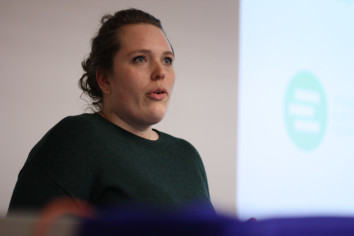
1. The European Union has often been criticized as being distant and bureaucratic. What room is there for young people in the European project?
Setting by side the traditional, federalist line of argumentation on how to combat the democratic deficit in the EU, it’s important to note the following: On paper, young people have the same access to European decision-makers as other age groups. Sometimes there are even special rooms opened for us. The Structured Dialogue and its newest cycle “Youth in Europe: what’s next?”, in which JEF Europe actively participates and which is coordinated by the Structured Dialogue ambassador, is for instance one of them. In this 18 months long process young people’s input is shaped into a document, which then is to be approved by the European Council. This, however, should not the only element we want to do. Evenmore so, as society is aging, the population pyramid and hence the attention that politicians pay is consolidating itself towards older people.
It’s therefore up to young people to not wonder what room is left for them; instead, we need to take up and claim that room ourselves! Just take the examples of Brexit or of global warming: there is so much on the line for us. So many decisions will need to be taken in these years in order for us to live a happy and long life. “It’s our future, it’s #ourEurope”, to quote the spirit of the political paper JEF Europe published after Brexit, is thus precisely the spirit we need to embrace. We do not need to hide ourselves - we are just as much a partner in the discussion on the future of Europe as the next age group. If we don’t take ourselves seriously, why should other people?
Thankfully, we have many dedicated activists in JEFers who don’t shy away and advocate for a federal Europe across our continent. How can we enable other young people to do so too? Civic education and training critical thinking are two crucial elements. Young citizens should be informed of their rights and duties, as well as on the political system they live in. With all this, we need to keep in mind our privileges (in the end, most of us are studying and somehow have resources (mostly not money, but time) to be a member of an organisation that makes room for itself in the European project) - strengthening the diversity in our organisation will not only benefit JEF, but also validate the European project by adding more legitimate voices to the debate.
2. What are the areas in which the Union needs to extend its cooperation immediately and what are the areas in which it needs to do so over the longer term?
The future of Europe discussion focuses a lot on which policy should be dealt on which level. The real question that we should ask is how should the institutional set up look like from all those scenarios? Surely, the Economic and Monetary Union should be further deepened, since Member States do not fight each other anymore, a European army would be a good proposal and like other initiatives, the Social Union will also hopefully be worth our taxpayers money. But the underlying root problem of intergovernmentalism has not been appropriately dealt with. If we have European problems, they need not to be discussed by national self-interests but should be taken care of at European level. That is what needs to be tackled by means of an institutional reform. Otherwise all the policy proposals, even if they look on the surface like what our movement has been proposing for years or decennia, will not work, in short- or long-term.
3. What is the most radically federalist position you take, in comparison with most pro-Europeans?
I’m a federalist. That is, by definition already, the most radically federalist position I take compared to pro-Europeans. Join me in a thought experiment and try to define pro-Europeans and their political aims. It’s impossible. Advocating for a federal Europe, however, is in my eyes clearly delineated to advocating in favour of a democratic institutional setup that is based on subsidiarity, i.e. where decisions are taken as closely as possible. That doesn’t mean JEF is not a home to pro-Europeans. Everyone who cares about the future of Europe and wants to “do more” when it comes to European democracy should be and is warmly welcomed at the table.
When I started in JEF, I wasn’t too sure about federalism either which was mainly because I didn’t know anything about it; “we need more Europe” was my go-to sentence but what does that practically entail? Focussing on the EU, do you talk about fully democratizing the EU by giving the European Parliament e.g. the right to initiate legislation or to elect a Commission President appointed on the basis of the EP results? Do you criticise the European Council / the national governments for playing the blame-game? Do you point at the flawed institutional set-up of the Economic and Monetary Union as one of the causes to the crises of the past years? I find that pro-Europeans tend to criticise or propose one or the other idea that might bring a change in the short-term. In contrast, federalists have a set of critiques linked with a set of proposals that would benefit the EU even in the long-term and thus, are compared to pro-Europeans more radical.
4. Should JEF become more politically involved, actively pushing for a federalist agenda during the next European elections in 2019, or should it move toward a more social role in establishing networks of likeminded Europeans across the Member States?
I don’t think it’s an either-or situation like the wording of the question suggests. As young European federalists, who work together in a political youth organisation, we should actively push for the federalist agenda in the next years. We keep saying it’s now or never; thus why should we mute ourselves, our vision and ideas right at a moment where it’s crucial to participate and actively shape the debate? But prioritizing advocacy and activities doesn’t mean we don’t establish or strengthen networks at the same time; in contrast, by being an active, shaping participant with a clear profile in our networks, we add value to us, our organisation and our networks.
5. What answer can the EU, and by extension JEF, give to the many movements for independence that we can see springing up, the most obvious example being Catalonia? Most of these movements definitely want to continue being part of the EU.
Independence movements each have their particular history and context. How the EU - or JEF - reacts or acts thus needs to be judged on a case-by-case basis. We are however, a post-nationalist organisation that advocates for a united Europe based on democracy and the respect of rule of law. If we take the case of Catalonia, we should respect that our members are on both sides of the debate.
As contact person for JEF Spain in the Executive Board, what I’ve been learning since mid-September is that members deemed it important to gather together in JEF, discuss and agree on a common position. In times of social media, where political differences are further amplified and decent discussions between two different political camps seem difficult, this process in JEF should be a lesson for politicians, too.
6. It can be said that young people have the most to gain or lose during every election, as their lives will be impacted for the longest period of time by any choice. How will Europe and JEF look in two years?
If someone has more information on how European politics will look like in 2019, please give them my contact details - I want all the spoilers! Because if the past years has taught us anything, then it’s that current developments are unpredictable. Who would have guessed two years ago, that a reality-star becomes US President or that the UK votes in favour of leaving the EU?
What we can actively work on though, is what our NGO can look like - if re-elected as Vice-President, I’d like to work on further professionalizing our work, gaining more visibility with JEFers in local sections and with external partners. Together with the new board, I want to empower our members to be activists, advocates, policy-writers, creators and part of our post-national community! You can find more information on my ideas here.


Follow the comments: |
|
